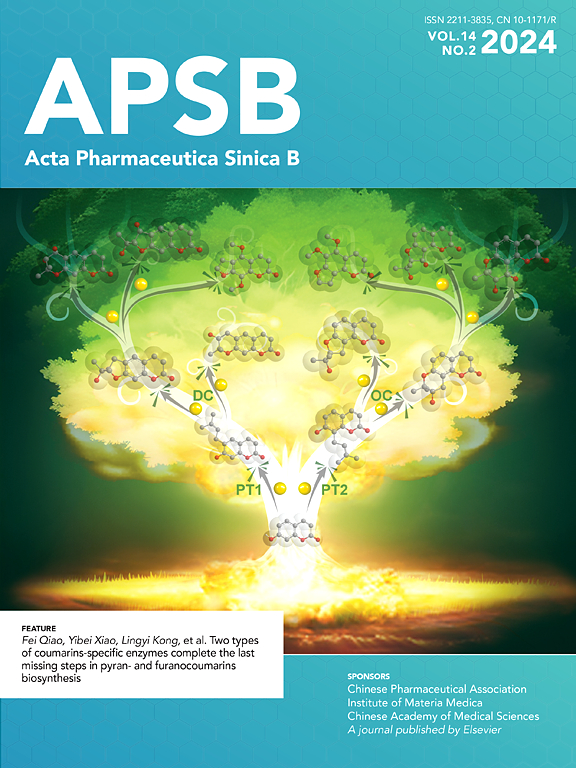RBM14增强p23的转录活性,调控CXCL1的表达,诱导肺癌转移
IF 14.6
1区 医学
Q1 PHARMACOLOGY & PHARMACY
引用次数: 0
摘要
转移是恶性肿瘤的一个指标,也是肿瘤的一个生物学特征。上皮-间质转化(Epithelial-mesenchymal transition, EMT)在促进肿瘤侵袭转移和增强肿瘤细胞侵袭性中起着关键作用。前列腺素E合成酶3 (p23)是热休克蛋白90 (HSP90)的合作伙伴。我们之前的研究表明p23在癌症相关炎症中是一个不依赖于hsp90的转录因子。本研究探讨p23在肺癌转移中的作用及其机制。通过体外细胞模型和体内小鼠尾静脉转移模型,研究结果提供了确凿的证据,证明p23通过调节下游CXCL1的表达,促进肺癌转移。p23不是独立作用,而是与rna结合基序蛋白14 (RBM14)形成复合物,促进肺癌EMT的进展。因此,我们的研究为RBM14-p23-CXCL1-EMT轴在肺癌转移中的潜在作用提供了证据。本文章由计算机程序翻译,如有差异,请以英文原文为准。

RBM14 enhances transcriptional activity of p23 regulating CXCL1 expression to induce lung cancer metastasis
Metastasis serves as an indicator of malignancy and is a biological characteristic of carcinomas. Epithelial–mesenchymal transition (EMT) plays a key role in the promotion of tumor invasion and metastasis and in the enhancement of tumor cell aggressiveness. Prostaglandin E synthase 3 (p23) is a cochaperone for heat shock protein 90 (HSP90). Our previous study showed that p23 is an HSP90-independent transcription factor in cancer-associated inflammation. The effect and mechanism of action of p23 on lung cancer metastasis are tested in this study. By utilizing cell models in vitro and mouse tail vein metastasis models in vivo, the results provide solid evidence that p23 is critical for promoting lung cancer metastases by regulating downstream CXCL1 expression. Rather than acting independently, p23 forms a complex with RNA-binding motif protein 14 (RBM14) to facilitate EMT progression in lung cancer. Therefore, our study provides evidence for the potential role of the RBM14–p23–CXCL1–EMT axis in the metastasis of lung cancer.
求助全文
通过发布文献求助,成功后即可免费获取论文全文。
去求助
来源期刊

Acta Pharmaceutica Sinica. B
Pharmacology, Toxicology and Pharmaceutics-General Pharmacology, Toxicology and Pharmaceutics
CiteScore
22.40
自引率
5.50%
发文量
1051
审稿时长
19 weeks
期刊介绍:
The Journal of the Institute of Materia Medica, Chinese Academy of Medical Sciences, and the Chinese Pharmaceutical Association oversees the peer review process for Acta Pharmaceutica Sinica. B (APSB).
Published monthly in English, APSB is dedicated to disseminating significant original research articles, rapid communications, and high-quality reviews that highlight recent advances across various pharmaceutical sciences domains. These encompass pharmacology, pharmaceutics, medicinal chemistry, natural products, pharmacognosy, pharmaceutical analysis, and pharmacokinetics.
A part of the Acta Pharmaceutica Sinica series, established in 1953 and indexed in prominent databases like Chemical Abstracts, Index Medicus, SciFinder Scholar, Biological Abstracts, International Pharmaceutical Abstracts, Cambridge Scientific Abstracts, and Current Bibliography on Science and Technology, APSB is sponsored by the Institute of Materia Medica, Chinese Academy of Medical Sciences, and the Chinese Pharmaceutical Association. Its production and hosting are facilitated by Elsevier B.V. This collaborative effort ensures APSB's commitment to delivering valuable contributions to the pharmaceutical sciences community.
 求助内容:
求助内容: 应助结果提醒方式:
应助结果提醒方式:


